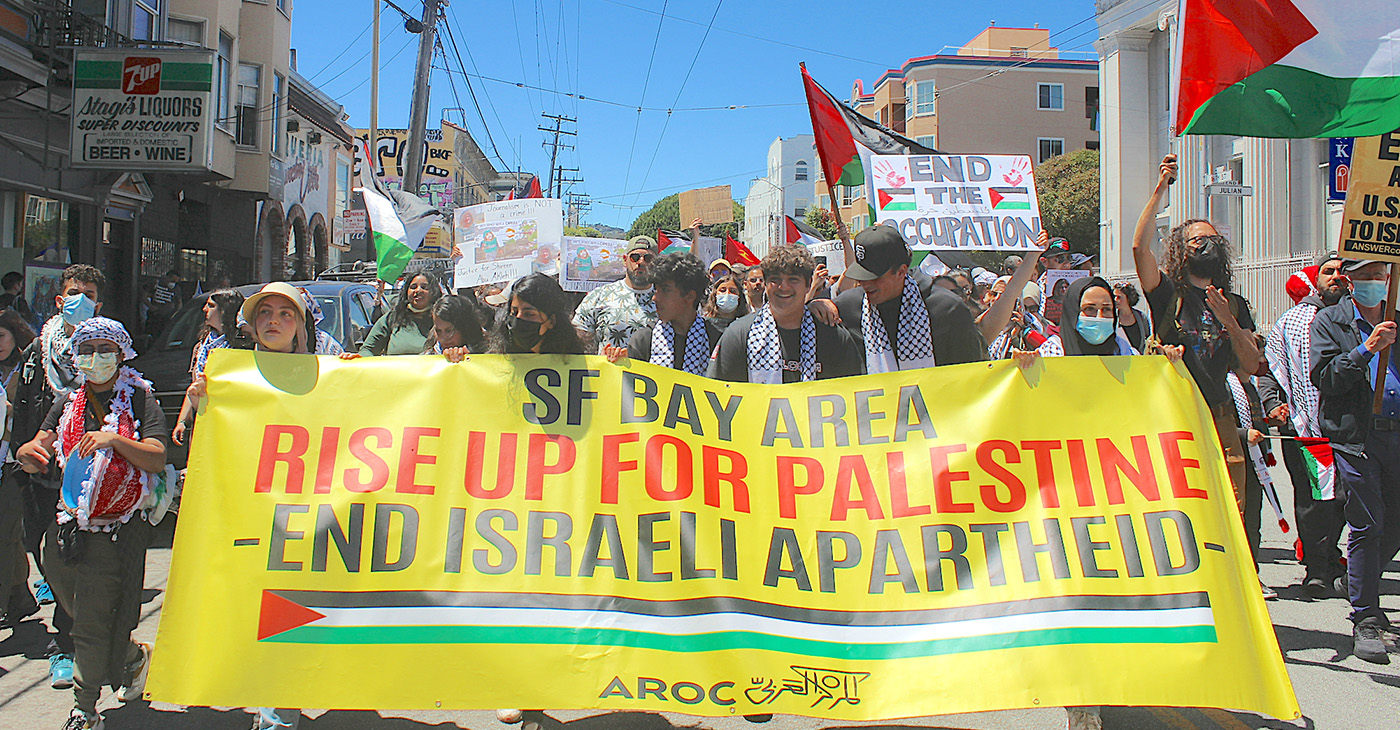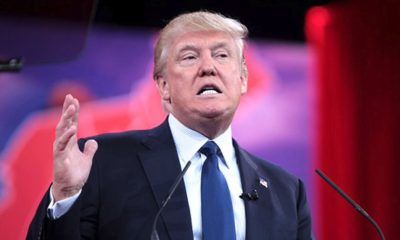Activism
Protest of Palestinian American Journalist’s Killing by Israeli Police Draws 500 in S.F.
“If you were a Palestinian anywhere around the world who watched the news since the late ’90s, you grew up with Shireen Abu Akleh,” said Sabreen Imtair, a San Francisco State University student and Arab Resource and Organizing Center (AROC) member in an interview during the protest. “A lot of people are saying they lost a household member. We are really feeling her loss right now.”

By Zack Haber
Starting at noon on May 14, over 500 people rallied and marched in San Francisco’s Mission District to protest the killing of Palestinian American journalist Shireen Abu Akleh and 74 years of Israeli occupation of Palestine.
“If you were a Palestinian anywhere around the world who watched the news since the late ’90s, you grew up with Shireen Abu Akleh,” said Sabreen Imtair, a San Francisco State University student and Arab Resource and Organizing Center (AROC) member in an interview during the protest. “A lot of people are saying they lost a household member. We are really feeling her loss right now.”
Abu Akleh, who had worked for the Al Jazeera news network for 25 years as one of the most prominent journalists reporting in Israeli-occupied Palestinian territories, died of a bullet wound on May 11 while covering an Israeli army raid in the Jenin refugee camp in the West Bank.
She was wearing a blue vest with large white letters stating “PRESS.” During Abu Akleh’s massive funeral on May 13, Israeli police beat people carrying her casket.
“We’re not even able to bury our dead in peace,” said AROC organizer Sharif Zakout during a speech at the San Francisco protest. “It’s disgusting.”
AROC, Palestinian Action Network, Palestinian Youth Movement, and Jewish Voice For Peace organized the San Francisco demonstration. It was one of at least 60 such actions occurring between May 14-16 around the world to remember Abu Akleh and to mark Nakba Day, an annual commemoration for Palestinians that began after 1948, when the British government formally stopped recognizing the state of Palestine and recognized Israel in its place.
This sparked the Arab-Israeli war when Zionist military forces expelled over 750,000 Palestinians and captured 78% of Palestine’s land.
In an interview at the protest, Lisa Rofel, a member of Jewish Voice For Peace, spoke out against Israeli occupation and explained why the Jewish group was present.
“We’re here because we strongly support the Palestinian struggle for liberation from Israeli occupation,” Rofel said. “It’s an occupation which has been vicious, cruel and inhumane and now has turned into military rule over almost every aspect of Palestinians’ lives. We also demand an end to U.S. complicity in that occupation.”
According to a report by Congressional Research Service, the Biden administration has allocated over $3.8 billion in military financing and missile defense funding to Israel this year.
During the demonstration, a diverse array of people that included elders along with young children, marched about a mile-long route carrying signs, banners, Palestinian flags, and art as they chanted in English and Arabic. Over 18 marchers carried one giant Palestinian flag together.
Some protesters carried signs stating 55 journalists have been killed by Israeli forces since 2000, a figure The Palestinian Journalists’ Union cites.
Other protesters carried signs calling attention to Ahmed Manasra, a 21-year-old Palestinian who has been imprisoned since he was arrested at age 13 after being with his cousin, who allegedly stabbed two Israeli settlers in Pisgat Ze’ev.
The International Committee of the Red Cross, UN bodies and the International Court of Justice considers Pisgat Ze’ev an illegal settlement.
Chris Gazaleh, a Palestinian American artist based in San Francisco, made some of the art for the rally by creating signs inspired by Palestinian architecture and Arabic calligraphy to represent cities that Zionists ethnically cleansed during the 1948 Nakba.
During a speech at this year’s San Francisco Nabka rally, Rivka Louissant, a Haitian cultural worker who organizes with the an anti-war and anti-racism coalition ANSWER, spoke about how people and organizations are increasingly supporting an end to Israeli occupation and the struggle for Palestinian autonomy.
“Support for Palestinian rights and BDS is more popular than ever,” Louissant said. “The public is waking up to the evils of imperialism.”
In April of last year, Human Rights Watch accused Israel of “crimes of apartheid,” and in February of this year, Amnesty International described Israel as an “apartheid system,” and characterized its treatment of Palestinians as “a crime against humanity.”
Some local politicians have recently shown support for Israel. During a speech at the rally, AROC organizer Sharif Zakout criticized San Francisco Board Supervisor Rafael Mandelman for his recent visit to Israel for the Israel Seminar in light of Shireen Abu Akleh’s killing. Zakout characterized the seminar as “a propaganda trip.” The Israel Seminar is organized by the Jewish Community Relations Council, which has taken a public stand against the BDS movement, and has refused to denounce Israeli attacks against Palestinians. Photos from the trip, posted on May 15 and 16, also show Berkeley Mayor Jesse Arreguín, and San Mateo Councilmember Amourence Lee.
“We are here today to say the Bay Area does not put up with that BS,” said Zakout to cheers from the protesters. “We stand with oppressed people everywhere. From Haiti to Palestine to Sri Lanka, we stand by resisting all state violence, colonialism, occupation and warfare.”
Activism
Gov. Newsom Approves $170 Million to Fast Track Wildfire Resilience
AB 100 approves major investments in regional conservancies across the state, including over $30 million each for the Sierra Nevada, Santa Monica Mountains, State Coastal, and San Gabriel/Lower LA Rivers and Mountains conservancies. An additional $10 million will support wildfire response and resilience efforts.

By Bo Tefu
California Black Media
With wildfire season approaching, last week Gov. Gavin Newsom signed Assembly Bill (AB) 100, unlocking $170 million to fast-track wildfire prevention and forest management projects — many of which directly protect communities of color, who are often hardest hit by climate-driven disasters.
“With this latest round of funding, we’re continuing to increase the speed and size of forest and vegetation management essential to protecting communities,” said Newsom when he announced the funding on April 14.
“We are leaving no stone unturned — including cutting red tape — in our mission to ensure our neighborhoods are protected from destructive wildfires,” he said.
AB 100 approves major investments in regional conservancies across the state, including over $30 million each for the Sierra Nevada, Santa Monica Mountains, State Coastal, and San Gabriel/Lower LA Rivers and Mountains conservancies. An additional $10 million will support wildfire response and resilience efforts.
Newsom also signed an executive order suspending certain regulations to allow urgent work to move forward faster.
This funding builds on California’s broader Wildfire and Forest Resilience Action Plan, a $2.7 billion effort to reduce fuel loads, increase prescribed burning, and harden communities. The state has also launched new dashboards to keep the public informed and hold agencies accountable.
California has also committed to continue investing $200 million annually through 2028 to expand this effort, ensuring long-term resilience, particularly in vulnerable communities.
Activism
California Rideshare Drivers and Supporters Step Up Push to Unionize
Today in California, over 600,000 rideshare drivers want the ability to form or join unions for the sole purpose of collective bargaining or other mutual aid and protection. It’s a right, and recently at the State Capitol, a large number of people, including some rideshare drivers and others working in the gig economy, reaffirmed that they want to exercise it.

By Antonio Ray Harvey
California Black Media
On July 5, 1935, President Franklin D. Roosevelt signed into federal law the National Labor Relations Act (NLRA). Also known as the “Wagner Act,” the law paved the way for employees to have “the right to self-organization, to form, join, or assist labor organizations,” and “to bargain collectively through representatives of their own choosing, according to the legislation’s language.
Today in California, over 600,000 rideshare drivers want the ability to form or join unions for the sole purpose of collective bargaining or other mutual aid and protection. It’s a right, and recently at the State Capitol, a large number of people, including some rideshare drivers and others working in the gig economy, reaffirmed that they want to exercise it.
On April 8, the rideshare drivers held a rally with lawmakers to garner support for Assembly Bill (AB) 1340, the “Transportation Network Company Drivers (TNC) Labor Relations Act.”
Authored by Assemblymembers Buffy Wicks (D-Oakland) and Marc Berman (D-Menlo Park), AB 1340 would allow drivers to create a union and negotiate contracts with industry leaders like Uber and Lyft.
“All work has dignity, and every worker deserves a voice — especially in these uncertain times,” Wicks said at the rally. “AB 1340 empowers drivers with the choice to join a union and negotiate for better wages, benefits, and protections. When workers stand together, they are one of the most powerful forces for justice in California.”
Wicks and Berman were joined by three members of the California Legislative Black Caucus (CLBC): Assemblymembers Tina McKinnor (D-Inglewood), Sade Elhawary (D-Los Angeles), and Isaac Bryan (D-Ladera Heights).
Yvonne Wheeler, president of the Los Angeles County Federation of Labor; April Verrett, President of Service Employees International Union (SEIU); Tia Orr, Executive Director of SEIU; and a host of others participated in the demonstration on the grounds of the state capitol.
“This is not a gig. This is your life. This is your job,” Bryan said at the rally. “When we organize and fight for our collective needs, it pulls from the people who have so much that they don’t know what to do with it and puts it in the hands of people who are struggling every single day.”
Existing law, the “Protect App-Based Drivers and Services Act,” created by Proposition (Prop) 22, a ballot initiative, categorizes app-based drivers for companies such as Uber and Lyft as independent contractors.
Prop 22 was approved by voters in the November 2020 statewide general election. Since then, Prop 22 has been in court facing challenges from groups trying to overturn it.
However, last July, Prop 22 was upheld by the California Supreme Court last July.
In a 2024, statement after the ruling, Lyft stated that 80% of the rideshare drivers they surveyed acknowledged that Prop 22 “was good for them” and “median hourly earnings of drivers on the Lyft platform in California were 22% higher in 2023 than in 2019.”
Wicks and Berman crafted AB 1340 to circumvent Prop 22.
“With AB 1340, we are putting power in the hands of hundreds of thousands of workers to raise the bar in their industry and create a model for an equitable and innovative partnership in the tech sector,” Berman said.
Activism
California Holds the Line on DEI as Trump Administration Threatens School Funding
The conflict began on Feb. 14, when Craig Trainor, acting assistant secretary for civil rights at the U.S. Department of Education (DOE), issued a “Dear Colleague” letter warning that DEI-related programs in public schools could violate federal civil rights law. The letter, which cited Title VI of the Civil Rights Act and the 2023 Supreme Court ruling in Students for Fair Admissions v. Harvard, which ended race-conscious admissions, ordered schools to eliminate race-based considerations in areas such as admissions, scholarships, hiring, discipline, and student programming.

By Joe W. Bowers Jr
California Black Media
California education leaders are pushing back against the Trump administration’s directive to dismantle diversity, equity, and inclusion (DEI) programs in its K-12 public schools — despite threats to take away billions in federal funding.
The conflict began on Feb. 14, when Craig Trainor, acting assistant secretary for civil rights at the U.S. Department of Education (DOE), issued a “Dear Colleague” letter warning that DEI-related programs in public schools could violate federal civil rights law. The letter, which cited Title VI of the Civil Rights Act and the 2023 Supreme Court ruling in Students for Fair Admissions v. Harvard, which ended race-conscious admissions, ordered schools to eliminate race-based considerations in areas such as admissions, scholarships, hiring, discipline, and student programming.
According to Trainor, “DEI programs discriminate against one group of Americans to favor another.”
On April 3, the DOE escalated the pressure, sending a follow-up letter to states demanding that every local educational agency (LEA) certify — within 10 business days — that they were not using federal funds to support “illegal DEI.” The certification requirement, tied to continued federal aid, raised the stakes for California, which receives more than $16 billion annually in federal education funding.
So far, California has refused to comply with the DOE order.
“There is nothing in state or federal law that outlaws the broad concepts of ‘diversity,’ ‘equity,’ or ‘inclusion,’” wrote David Schapira, California’s Chief Deputy Superintendent of Public Instruction, in an April 4 letter to superintendents and charter school administrators. Schapira noted that all of California’s more than 1,000 traditional public school districts submit Title VI compliance assurances annually and are subject to regular oversight by the state and the federal government.
In a formal response to the DOE on April 11, the California Department of Education, the State Board of Education, and State Superintendent of Public Instruction Tony Thurmond collectively rejected the certification demand, calling it vague, legally unsupported, and procedurally improper.
“California and its nearly 2,000 LEAs (including traditional public schools and charter schools) have already provided the requisite guarantee that its programs and services are, and will be, in compliance with Title VI and its implementing regulation,” the letter says.
Thurmond added in a statement, “Today, California affirmed existing and continued compliance with federal laws while we stay the course to move the needle for all students. As our responses to the United States Department of Education state and as the plain text of state and federal laws affirm, there is nothing unlawful about broad core values such as diversity, equity and inclusion. I am proud of our students, educators and school communities who continue to focus on teaching and learning, despite federal actions intended to distract and disrupt.”
California officials say that the federal government cannot change existing civil rights enforcement standards without going through formal rule-making procedures, which require public notice and comment.
Other states are taking a similar approach. In a letter to the DOE, Daniel Morton-Bentley, deputy commissioner and counsel for the New York State Education Department, wrote, “We understand that the current administration seeks to censor anything it deems ‘diversity, equity & inclusion.’ But there are no federal or State laws prohibiting the principles of DEI.”
-

 Activism4 weeks ago
Activism4 weeks agoOakland Post Endorses Barbara Lee
-

 Activism3 weeks ago
Activism3 weeks agoOakland Post: Week of April 2 – 8, 2025
-

 #NNPA BlackPress3 weeks ago
#NNPA BlackPress3 weeks agoTrump Profits, Black America Pays the Price
-

 Activism2 weeks ago
Activism2 weeks agoOakland Post: Week of April 9 – 15, 2025
-

 #NNPA BlackPress3 weeks ago
#NNPA BlackPress3 weeks agoHarriet Tubman Scrubbed; DEI Dismantled
-

 #NNPA BlackPress3 weeks ago
#NNPA BlackPress3 weeks agoTrump Targets a Slavery Removal from the National Museum of African-American History and Culture
-

 #NNPA BlackPress3 weeks ago
#NNPA BlackPress3 weeks agoLawmakers Greenlight Reparations Study for Descendants of Enslaved Marylanders
-

 #NNPA BlackPress3 weeks ago
#NNPA BlackPress3 weeks agoNew York Stands Firm Against Trump Administration’s Order to Abandon Diversity in Schools
























































